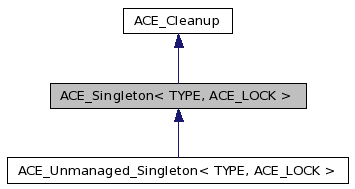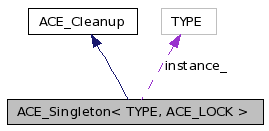
#include <Singleton.h>
Inheritance diagram for ACE_Singleton< TYPE, ACE_LOCK >:


Public Member Functions | |
| virtual void | cleanup (void *param=0) |
Static Public Member Functions | |
| static TYPE * | instance (void) |
| Global access point to the Singleton. | |
| static void | dump (void) |
| Dump the state of the object. | |
Protected Member Functions | |
| ACE_Singleton (void) | |
| Default constructor. | |
Static Protected Member Functions | |
| static ACE_Singleton< TYPE, ACE_LOCK > *& | instance_i (void) |
| Get pointer to the Singleton instance. | |
Protected Attributes | |
| TYPE | instance_ |
| Contained instance. | |
Static Protected Attributes | |
| static ACE_Singleton< TYPE, ACE_LOCK > * | singleton_ = 0 |
| Pointer to the Singleton (ACE_Cleanup) instance. | |
This implementation is a slight variation on the GoF Singleton pattern. In particular, a single <ACE_Singleton<TYPE, ACE_LOCK> > instance is allocated here, not a <TYPE> instance. The reason for this is to allow registration with the ACE_Object_Manager, so that the Singleton can be cleaned up when the process exits. For this scheme to work, a (static) cleanup() function must be provided. ACE_Singleton provides one so that TYPE doesn't need to. If you want to make sure that only the singleton instance of <T> is created, and that users cannot create their own instances of <T>, do the following to class <T>: (a) Make the constructor of <T> private (or protected) (b) Make Singleton a friend of <T> Here is an example:
* class foo
* {
* friend class ACE_Singleton<foo, ACE_Null_Mutex>;
* private:
* foo () { cout << "foo constructed" << endl; }
* ~foo () { cout << "foo destroyed" << endl; }
* };
* typedef ACE_Singleton<foo, ACE_Null_Mutex> FOO;
*
Definition at line 79 of file Singleton.h.
| ACE_BEGIN_VERSIONED_NAMESPACE_DECL ACE_INLINE ACE_Singleton< TYPE, ACE_LOCK >::ACE_Singleton | ( | void | ) | [protected] |
| void ACE_Singleton< TYPE, ACE_LOCK >::cleanup | ( | void * | param = 0 |
) | [virtual] |
Cleanup method, used by <ace_cleanup_destroyer> to destroy the ACE_Singleton.
Reimplemented from ACE_Cleanup.
Definition at line 109 of file Singleton.cpp.
References ACE_Singleton< TYPE, ACE_LOCK >::instance_i().
Referenced by ACE_Unmanaged_Singleton< TYPE, ACE_LOCK >::close().
00110 { 00111 delete this; 00112 ACE_Singleton<TYPE, ACE_LOCK>::instance_i () = 0; 00113 }
| ACE_BEGIN_VERSIONED_NAMESPACE_DECL void ACE_Singleton< TYPE, ACE_LOCK >::dump | ( | void | ) | [static] |
Dump the state of the object.
Reimplemented in ACE_Unmanaged_Singleton< TYPE, ACE_LOCK >.
Definition at line 29 of file Singleton.cpp.
References ACE_DEBUG, ACE_END_DUMP, ACE_TEXT, ACE_TRACE, and LM_DEBUG.
00030 { 00031 #if defined (ACE_HAS_DUMP) 00032 ACE_TRACE ("ACE_Singleton<TYPE, ACE_LOCK>::dump"); 00033 00034 #if !defined (ACE_LACKS_STATIC_DATA_MEMBER_TEMPLATES) 00035 ACE_DEBUG ((LM_DEBUG, ACE_TEXT ("instance_ = %x"), 00036 ACE_Singleton<TYPE, ACE_LOCK>::instance_i ())); 00037 ACE_DEBUG ((LM_DEBUG, ACE_END_DUMP)); 00038 #endif /* ACE_LACKS_STATIC_DATA_MEMBER_TEMPLATES */ 00039 #endif /* ACE_HAS_DUMP */ 00040 }
| TYPE * ACE_Singleton< TYPE, ACE_LOCK >::instance | ( | void | ) | [static] |
Global access point to the Singleton.
Reimplemented in ACE_Unmanaged_Singleton< TYPE, ACE_LOCK >.
Definition at line 57 of file Singleton.cpp.
References ACE_GUARD_RETURN, ACE_NEW_RETURN, ACE_TRACE, ACE_Object_Manager::at_exit(), ACE_Singleton< TYPE, ACE_LOCK >::instance_, ACE_Singleton< TYPE, ACE_LOCK >::instance_i(), ACE_Object_Manager::shutting_down(), and ACE_Object_Manager::starting_up().
Referenced by ACE::Monitor_Control::Monitor_Point_Registry::instance().
00058 { 00059 ACE_TRACE ("ACE_Singleton<TYPE, ACE_LOCK>::instance"); 00060 00061 ACE_Singleton<TYPE, ACE_LOCK> *&singleton = 00062 ACE_Singleton<TYPE, ACE_LOCK>::instance_i (); 00063 00064 // Perform the Double-Check pattern... 00065 if (singleton == 0) 00066 { 00067 if (ACE_Object_Manager::starting_up () || 00068 ACE_Object_Manager::shutting_down ()) 00069 { 00070 // The program is still starting up, and therefore assumed 00071 // to be single threaded. There's no need to double-check. 00072 // Or, the ACE_Object_Manager instance has been destroyed, 00073 // so the preallocated lock is not available. Either way, 00074 // don't register for destruction with the 00075 // ACE_Object_Manager: we'll have to leak this instance. 00076 00077 ACE_NEW_RETURN (singleton, (ACE_Singleton<TYPE, ACE_LOCK>), 0); 00078 } 00079 else 00080 { 00081 #if defined (ACE_MT_SAFE) && (ACE_MT_SAFE != 0) 00082 // Obtain a lock from the ACE_Object_Manager. The pointer 00083 // is static, so we only obtain one per ACE_Singleton 00084 // instantiation. 00085 static ACE_LOCK *lock = 0; 00086 if (ACE_Object_Manager::get_singleton_lock (lock) != 0) 00087 // Failed to acquire the lock! 00088 return 0; 00089 00090 ACE_GUARD_RETURN (ACE_LOCK, ace_mon, *lock, 0); 00091 00092 if (singleton == 0) 00093 { 00094 #endif /* ACE_MT_SAFE */ 00095 ACE_NEW_RETURN (singleton, (ACE_Singleton<TYPE, ACE_LOCK>), 0); 00096 00097 // Register for destruction with ACE_Object_Manager. 00098 ACE_Object_Manager::at_exit (singleton); 00099 #if defined (ACE_MT_SAFE) && (ACE_MT_SAFE != 0) 00100 } 00101 #endif /* ACE_MT_SAFE */ 00102 } 00103 } 00104 00105 return &singleton->instance_; 00106 }
| ACE_Singleton< TYPE, ACE_LOCK > *& ACE_Singleton< TYPE, ACE_LOCK >::instance_i | ( | void | ) | [static, protected] |
Get pointer to the Singleton instance.
Reimplemented in ACE_Unmanaged_Singleton< TYPE, ACE_LOCK >.
Definition at line 43 of file Singleton.cpp.
References ACE_Singleton< TYPE, ACE_LOCK >::singleton_.
Referenced by ACE_Singleton< TYPE, ACE_LOCK >::cleanup(), and ACE_Singleton< TYPE, ACE_LOCK >::instance().
00044 { 00045 #if defined (ACE_LACKS_STATIC_DATA_MEMBER_TEMPLATES) 00046 // Pointer to the Singleton instance. This works around a bug with 00047 // G++ and it's (mis-)handling of templates and statics... 00048 static ACE_Singleton<TYPE, ACE_LOCK> *singleton_ = 0; 00049 00050 return singleton_; 00051 #else 00052 return ACE_Singleton<TYPE, ACE_LOCK>::singleton_; 00053 #endif /* ACE_LACKS_STATIC_DATA_MEMBER_TEMPLATES */ 00054 }
TYPE ACE_Singleton< TYPE, ACE_LOCK >::instance_ [protected] |
Contained instance.
Definition at line 97 of file Singleton.h.
Referenced by ACE_Unmanaged_Singleton< TYPE, ACE_LOCK >::instance(), and ACE_Singleton< TYPE, ACE_LOCK >::instance().
ACE_Singleton< TYPE, ACE_LOCK > * ACE_Singleton< TYPE, ACE_LOCK >::singleton_ = 0 [static, protected] |
Pointer to the Singleton (ACE_Cleanup) instance.
Reimplemented in ACE_Unmanaged_Singleton< TYPE, ACE_LOCK >.
Definition at line 101 of file Singleton.h.
Referenced by ACE_Singleton< TYPE, ACE_LOCK >::instance_i().
 1.4.7
1.4.7